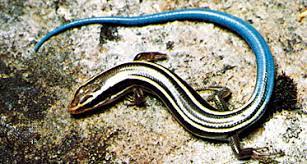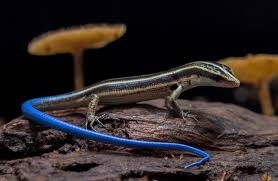by David Oates
 A scar is a shiny place with a story.
A scar is a shiny place with a story.
A skink is a story you could never imagine.
It leaves a bright streak across your vision and an after-image you might notice even years later, neon greeny blue flashing amidst weed and dry stone and buckbrush and bending sumac trees. Our mountains were called the San Gabriels, a name somehow just barely noble enough for these creatures. In their foothills skinks appeared to us like tiny fragile dragons, fully astonishing, sinuous, and menacing. They liked to writhe. Would bite, the bony jaws clamping onto a fingertip, a ten-year-old’s screaming terror – until it was seen that the grim little mouth could not break the skin. The beast just hung on there, flailing, until screams turned to laughter and showing off, “Lookit, lookit, lookit. . .!”
If someone tried to tell you about skink, it would sound like a lie, an exaggeration. Just seeing it certainly outstripped the lame awe-mongering of, for example, Superman comic books.
And made you wonder what else might be out there.
When my mother’s voice rose up on a summer eve, and we had been allowed to play outside after dinner. When I noticed the mourning doves silhouetted on telephone wires above us, repeating and repeating their strangeness and sadness. Perhaps I would see her standing in the illuminated doorway, in the warm air full of chaparral scent drifting downhill off the mountains. Her voice calling then falling still, while the blue-black sky gathered evening under itself. And us in it.
Then the boys would come barging back into the house, and the mood would break and be replaced with all the reassuring commotion we could muster.
Once in a while my mom would accidentally back into the truth, like hitting something in the garage with her fender. “Well, we raised them by hand, so. . .” This was not really apology, just what we were: three dusty, slightly used boys, with dents here and there and unstraightened teeth.
* * *
Ours was a hot country, dry, with a huge city just off to our west providing smog to breathe day by day and all the traffic a boy could ask for. Our corner of it seemed cozy, though, and mostly safe. It might have been Alhambra – or even The Alhambra – but it wasn’t. We walked to school on the skirt of the street, no one around there had thought of sidewalks yet.
We knew how to turn over rocks on hillsides or on our own mostly-landscaped quarter-acre. From our back cyclone fence, the brushlands ran unbroken all the way up to the tops of the blue-gray mountains, and from this dense refuge foxes and rabbits would step or hop into our vicinity regularly, which kept us looking and, amazingly, taught us to quiet down once in a while to see. To see. Raccoons overnight, of course, and possums. A turtle offered itself to us once or twice, one turtle or two, who knows, carrying its own story that just could not, could not be imagined. How does a slow dumb thing like that live? We didn’t try to domesticate it, but it stuck around a few days for lettuce treats before disappearing back under the fence. Or wherever turtles go to turtle in peace.
Turning over rocks, hunting for god knows what, we knew how to avoid the little scorpions, and how to shout out “centipede!” in real horror, because these were truly scary: five inches long, black along the back but amber-browny along the edges and legs, way too many legs. And a split tail dragging behind that certainly looked like terrible stingers. Who knew what a centipede really did? Not us. We killed scorpions but left those leggy things alone. Gave them a wide margin. Found some other part of the hillside to ransack.
 But a skink! It was a find, a treasure, an event that marked the day. A dreamlike eel-flash curving faster than hand could catch – usually. A bolt of dirt-lightning, a striped impossibility. Prehistoric, or possibly extraterrestrial. When caught, a twisting pencil of untameableness, lizard tail whipping and lashing, of a deep black back but with long two cream stripes setting it off. And underneath, more of that blue-green belly, electric.
But a skink! It was a find, a treasure, an event that marked the day. A dreamlike eel-flash curving faster than hand could catch – usually. A bolt of dirt-lightning, a striped impossibility. Prehistoric, or possibly extraterrestrial. When caught, a twisting pencil of untameableness, lizard tail whipping and lashing, of a deep black back but with long two cream stripes setting it off. And underneath, more of that blue-green belly, electric.
* * *
The difficulty can be, to decide if a wound is an error or an opening.
Once there was a time when I was in bed, dizzy for some hours from having fallen on my head again. And for some reason my dad called in a dog-pound guy to look at me – his truck had been mysteriously parked on our street for most of the morning. I remember him appearing in his green uniform, with sewn embroidered patches of office. And I think those buttoned epaulets too; so, you know, laden with authority. He prescribed bed rest. And the next day, after twenty-four hours in the darkened room, I got a transistor radio the size of a pack of cigarettes as a gift from my dad. (Who did not smoke. Just to be clear. Baptists.) It was a talisman of getting well, or being almost thirteen, or both.
I soon learned to listen to it under the covers with the little earphone on its beige cord feeding me Top 40 hits. I could recite the hit songs for you, should you buy me a beer. (No longer Baptist.) They were the mostly silly things of the pre-Beatles era, aimed really at another cohort, the older kids who dated, like the blonde pony-tailed and entirely unimaginable older sister of my best friend Noel. But I listened anyway. Feeling like maybe this was something I would someday belong to.
It wasn’t. In some sense I never did get fully undizzy. My life became increasingly skinky from that point, and my dad had no gift for following what I was making of myself, year by year. Me keeping my strangeness to myself at first. Only at first though.
A while after that event, I cut my leg right across the shinbone by running into a piece of rebar that had been pounded into the upper part of our lot as a stake for some reason. It was sharp with bent-over curls of iron where the hammer struck it, and it opened me up good. I think the white of bone might have been visible, if you looked, but I tried not to. I wasn’t quite a little kid any more, getting too old to cry. But my family wasn’t one to go running off for stitches, so my dad just told me to brace myself, peroxided it, and taped it shut with a big wad of gauze. The usual. He seemed thoughtful though, and he surprised me by putting the whole weight of his hand right onto my head when we were done, warm and comforting, and I just sat there, not snivelling, which would have been shameful, but a couple of tears sliding down my face because it really did hurt. And it was of course scary to see too much of the inside stuff.
If ever you come walk with me on a summer day too hot for long pants, you’ll see it there shining on my leg at a sort of chevron-stripe angle, as if it had earned me some kind of rank. But we’ll both know it signifies only the usual thing, a little pain, some passing tears. My dad has passed too – I’m old myself now. And I think, looking back, that he was already wondering about me. What we never could patch up. After a couple decades of difficulty I came out to him (as the saying goes), and after that it was nothing but pretending between us. Though I could see he missed me.
But the real story isn’t that. What the scar says to me is the real story, just steady love, delivered undramatically. Mildly competent, slightly distracted. The story that stretches for all those childhood years. Daily bread. A bath. A steady hand.
If I go searching for the drama. If I wonder, where’s my suffering. If I think, is this even a story at all. Then I remember the wedge-shaped moments that didn’t fit. Where I wondered, well then where are we, really? And who are these people, so kind and kindly bumbling?
I was their bumble.
They loved me anyway.
Anyway is the story. Life is the scar.
Skink is the word for all of it – all that can’t be explained, beauty and lightning and pain and scary bits that don’t kill you after all. Or anyway, not for a long long time.
